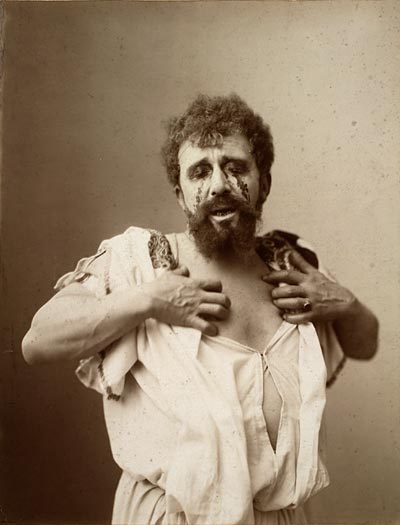Aristotle on Tragedy
Definition of Tragedy
“Tragedy is an imitation of an action that is serious, complete, and of a certain magnitude; in language embellished with each kind of artistic ornament. . . in the form of action, not of narrative; with incidents arousing pity and fear, wherewith to accomplish its catharsis of such emotions.” Aristotle
Must have a Tragic Figure
-
Must excite pity and fear – one who is neither evil nor extremely virtuous; misfortune for the Tragic Figure is brought about not by vice or depravity, but by some error or frailty – his Tragic Flaw.
- Be of High Stature
-
Be extraordinary, not typical
Must be Serious
The stuff of tragedy must be serious – must be something monumental such as the assassination of a President which significantly alters all our lives; it must have profound consequences involving people whose fate affects many beyond themselves; it is a public event rather than a private event.
Must have a Tragic Flaw
-
Some error or frailty which brings about the Tragic Figure’s misfortune
- 7 Deadly Sins: Pride, Envy, Wrath, Lust, Sloth, Greed, Gluttony
- External circumstances can also contribute to the downfall
The Tragic Hero
-
Must be a noble King or Ruler (but the audience should be able to identify with the hero)
-
Must have a tragic flaw: Hubris (Pride)
-
Downfall must be caused by his own actions and must be a result of his tragic flaw
-
Must have recognition of his own demise
-
He should die with honor and courage

Tragedy must have a Certian Magnitude
- Action in a tragedy must have magnitude
- Must be a convincing chain of events that change a situation from good to bad fortune.
Tragedy must have “Embellished Language”
Aristotle says tragedy should be expressed in poetry – the highest form of expression in Aristotle’s time
Tragedy must take “the form of action, not of narrative”
- Aristotle believes the lines should be acted, not simply read or told.
- Audience must see the drama unfold before them.
Evoke Pity & Fear
- Tragedy makes the audience fear that such events could happen to them
- Tragedy makes the audience feel pity for the Tragic Figure
Tragedy must evoke “Catharsis”
- Catharsis is the process of purging the audience’s pity and fear
- Catharsis allows the audience to leave uplifted because their emotions have been expended in the theater
- The Tragic Figure’s acceptance of his/her fate is an affirmation of human values
- The audience receives solace through the insight provided by the Tragic Figure’s suffering
Tragedy includes Dramatic Irony
- Dramatic Irony occurs when the audience knows things that the characters on stage do not; therefore, the audience has insight and can interpret actions and information differently than the characters.
Aristotle’s Definition of Tragedy
PERIPATEIA
Plot reversal.
A pivotal or crucial action on the part of the protagonist that changes the situation from seemingly secure to vulnerable.
The Perfect Tragedy
- According to Aristotle, the best example of the perfect tragedy was Oedipus Rex.

Aristotelian Method
- Plot
- Character
- Theme (Thought)
- Diction
- Rhythm (Melody)
- Spectacle
Plot
- Complete & Complex with a beginning, middle, & end
- Events must lead naturally to what follows and point toward the end
- End must follow naturally from what has gone before and conclude the action
- Complex – moves in various directions by means of reversal and recognition
- Reversal – accuser becomes the accused & the prosecuter becomes the defendant
- Recognition – change from ignorance to knowledge; increases the tragic effect of the drama
Three Unities
- Time: the action should take place in 24 hours – ideally it should all be congruous, but 24 hours is ok
- Place – one location – no set changes
- Action – just one plot – no sub plots
- (the mysterious fourth – mood the entire play should be serious – no comic relief)
Character
- Character will support the plot i.e. personal motivations will be intricately connected parts of the cause-and-effect chain of actions producing pity and fear in the audience.
- “Good or fine”
- “True to type”
- “True to Life”
- “Consistent”
- “Necessary or probable”
Theme (Thought)
- True and Good
- Logical
- Complex
Diction
-
“expression of the meaning in words” which are proper and appropriate to the plot, characters, and the end of the tragedy.
-
Aristotle is greatly concerned with metaphors
“It is the mark of genius, for to make good metaphors implies an eye for resemblances”
Rhythm (Melody)
- Musical Element of the Chorus (Narration in Modern storytelling)
- Chorus should be fully integrated into the play like an actor, choral odes should not be “mere interludes,” but should contribute to the unity of the plot.
SPECTACLE
Everything that doesn't fit into the other categories
Least connected with literature
“The production of spectacular effects depends more on the art of the stage machinist than on that of the poet.”
Deus ex machina “God of the machine”
Cirque du Soleil
Oh, the Insanity!!!!

Aristotle on Tragedy
By Jeffrey Winkler
Aristotle on Tragedy
- 1,619



